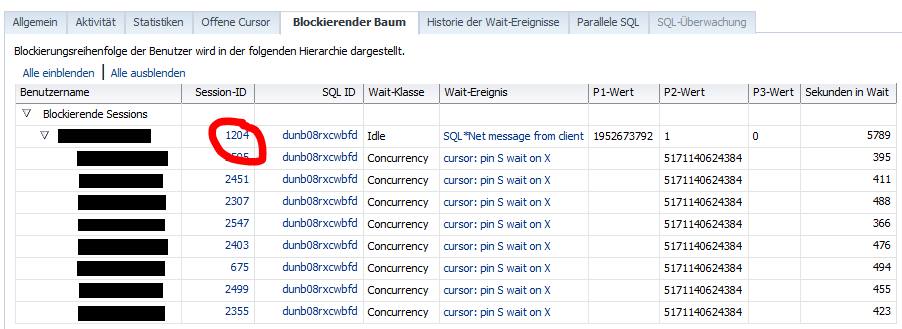This seems to be a bug in Oracle when CLOB data types are used as values that are passed to the MERGE statement's ON clause. Assume this database:
CREATE TABLE t (
v INT,
s VARCHAR2(400 CHAR)
);
Reproduction using inlined values
Now, run the following statement in any Oracle client, including SQL*Plus, SQL Developer or from JDBC, which helps reproducing the issue very easily (I'm using Oracle 11g XE 11.2.0.2.0):
MERGE INTO t
USING (
SELECT
1 v,
CAST('abc' AS CLOB) s
FROM DUAL
) s
ON (t.s = s.s) -- Using a CLOB here causes the bug.
WHEN MATCHED THEN UPDATE SET
t.v = s.v
WHEN NOT MATCHED THEN INSERT (v, s)
VALUES (s.v, s.s);
The example is silly, and the CLOB was bound here by "accident". Nonetheless, such a statement should not create a zombie session in Oracle, but it's there. I'm running the above statement three times in SQL*Plus and then running this...
SELECT
s.sid,
s.serial#,
s.sql_id,
s.event,
s.blocking_session,
q.sql_text
FROM v$session s
JOIN v$sql q
ON s.sql_id = q.sql_id
WHERE s.username = 'TEST'
AND UPPER(TRIM(q.sql_text)) LIKE 'MERGE%';
... I get:
sid serial# sql_id event blocking_session
9 3 82a2k4sqzy1jq cursor: pin S wait on X 92
49 89 82a2k4sqzy1jq cursor: pin S wait on X 92
92 13 82a2k4sqzy1jq db file sequential read
Notice how the reported event is different ("db file sequential read") from the original event ("SQL*Net message from client"), which was using bind variables
Reproduction using bind values
var v_s varchar2(50)
exec :v_s := 'abc'
MERGE INTO t
USING (
SELECT
1 v,
CAST(:v_s AS CLOB) s
FROM DUAL
) s
ON (t.s = s.s) -- Using a CLOB here causes the bug.
WHEN MATCHED THEN UPDATE SET
t.v = s.v
WHEN NOT MATCHED THEN INSERT (v, s)
VALUES (s.v, s.s);
The above statement run in SQL*Plus also produces the bug:
sid serial# sql_id event blocking_session
8 1 4w9zuxrumumgj SQL*Net message from client
90 7 4w9zuxrumumgj cursor: pin S wait on X 8
94 21 4w9zuxrumumgj cursor: pin S wait on X 8
No reproduction in PL/SQL
Interestingly, the bug is avoided in the following PL/SQL statement:
DECLARE
v_s CLOB := 'abc';
BEGIN
MERGE INTO t
USING (
SELECT
1 v,
CAST(v_s AS CLOB) s
FROM DUAL
) s
ON (t.s = s.s) -- Using a CLOB here causes the bug.
WHEN MATCHED THEN UPDATE SET
t.v = s.v
WHEN NOT MATCHED THEN INSERT (v, s)
VALUES (s.v, s.s);
END;
/
I'm getting:
CAST(v_s AS CLOB) s
*
ERROR at line 8:
ORA-06550: line 8, column 11:
PL/SQL: ORA-00932: inconsistent datatypes: expected - got CLOB
ORA-06550: line 4, column 7:
PL/SQL: SQL Statement ignored
It looks as though the PL/SQL engine saveguards clients from this SQL engine bug.


ON (t.s = s.s)is strange. AFAIK Oracle semantic check should not allow LOB comparison ( at least in where clause). – Spurtle